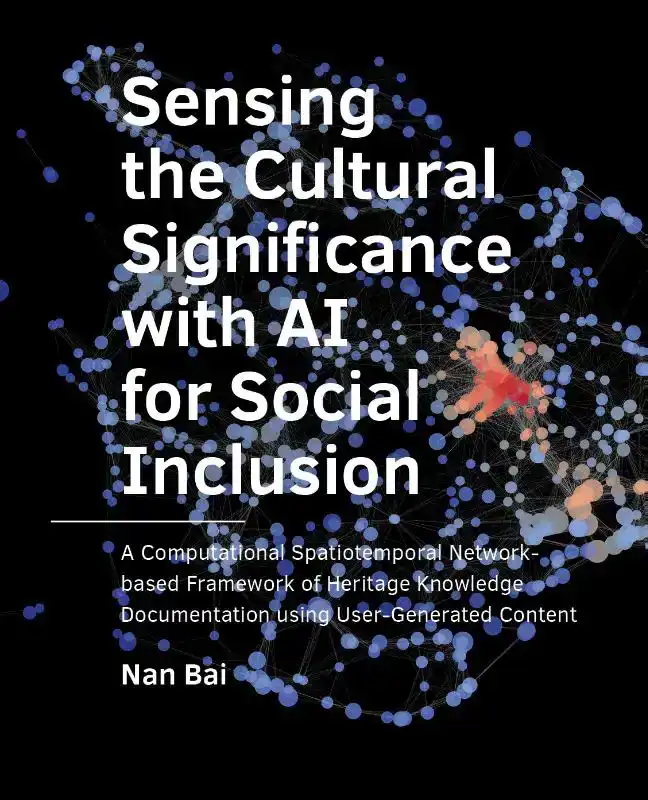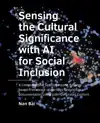- Engels
- Study
- nature & science
- technische wetensch.
- bouwkunde
- SENSING THE CULTURAL SIGNIFICANCE WITH AI FOR SOCIAL INCLUSI
BAI, NAN
SENSING THE CULTURAL SIGNIFICANCE WITH AI FOR SOCIAL INCLUSI
29,95incl BTW
Vertrouwd sinds 1927
Persoonlijke aandacht en advies
Vanaf 17,50 gratis verzenden NL & BE
Meer dan 150.000 artikelen online
Omschrijving SENSING THE CULTURAL SIGNIFICANCE WITH AI FOR SOCIAL INCLUSI
Social Inclusion has been growing as a goal in heritage management. Whereas the 2011 UNESCO Recommendation on the Historic Urban Landscape (HUL) called for tools of knowledge documentation, social media already functions as a platform for online comm
unities to actively involve themselves in heritage-related discussions. Such discussions happen both in "baseline scenarios" when people calmly share their experiences about the cities they live in or travel to, and in "activated scenarios" when radi
cal events trigger their emotions. To organize, process, and analyse the massive unstructured multi-modal (mainly images and texts) user-generated data from social media efficiently and systematically, Artificial Intelligence (AI) is shown to be indi
spensable. This thesis explores the use of AI in a methodological framework to include the contribution of a larger and more diverse group of participants with user-generated data. It is an interdisciplinary study integrating methods and knowledge fr
om heritage studies, computer science, social sciences, network science, and spatial analysis. AI models were applied, nurtured, and tested, helping to analyse the massive information content to derive the knowledge of cultural significance perceived
by online communities. The framework was tested in case study cities including Venice, Paris, Suzhou, Amsterdam, and Rome for the baseline and/or activated scenarios. The AI-based methodological framework proposed in this thesis is shown to be able
to collect information in cities and map the knowledge of the communities about cultural significance, fulfilling the expectation and requirement of HUL, useful and informative for future socially inclusive heritage management processes.
unities to actively involve themselves in heritage-related discussions. Such discussions happen both in "baseline scenarios" when people calmly share their experiences about the cities they live in or travel to, and in "activated scenarios" when radi
cal events trigger their emotions. To organize, process, and analyse the massive unstructured multi-modal (mainly images and texts) user-generated data from social media efficiently and systematically, Artificial Intelligence (AI) is shown to be indi
spensable. This thesis explores the use of AI in a methodological framework to include the contribution of a larger and more diverse group of participants with user-generated data. It is an interdisciplinary study integrating methods and knowledge fr
om heritage studies, computer science, social sciences, network science, and spatial analysis. AI models were applied, nurtured, and tested, helping to analyse the massive information content to derive the knowledge of cultural significance perceived
by online communities. The framework was tested in case study cities including Venice, Paris, Suzhou, Amsterdam, and Rome for the baseline and/or activated scenarios. The AI-based methodological framework proposed in this thesis is shown to be able
to collect information in cities and map the knowledge of the communities about cultural significance, fulfilling the expectation and requirement of HUL, useful and informative for future socially inclusive heritage management processes.
Specificaties
- MerkBK Books
- GroepTECHNISCHE WETENSCH (950)
- Barcode9789463667494
- LeverstatusActief
Reviews
0.0/5.0
Gemiddelde uit 0 reviews
Meest behulpzame reviews
Nog geen reviews geschreven


